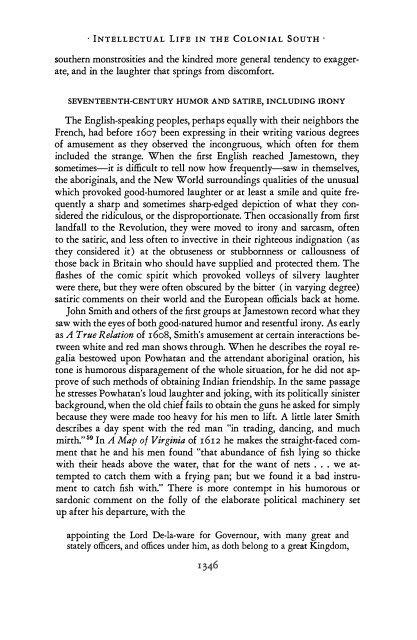Literature, Principally Belletristic - University of Tennessee, Knoxville
Literature, Principally Belletristic - University of Tennessee, Knoxville
Literature, Principally Belletristic - University of Tennessee, Knoxville
Create successful ePaper yourself
Turn your PDF publications into a flip-book with our unique Google optimized e-Paper software.
· INTELLECTU AL LIFE IN THE COLONIAL SOUTH '<br />
southern monstrosities and the kindred more general tendency to exagger<br />
ate, and in the laughter that springs from discomfort.<br />
SEVENTEENTH-CENTURY HUMOR AND SATIRE, INCLUDING IRONY<br />
The English-speaking peoples, perhaps equally with their neighbors the<br />
French, had before 1607 been expressing in their writing various degrees<br />
<strong>of</strong> amusement as they observed the incongruous, which <strong>of</strong>ten for them<br />
included the strange. When the first English reached Jamestown, they<br />
sometimes-it is difficult to tell now how frequently-saw in themselves,<br />
the aboriginals, and the New World surroundings qualities <strong>of</strong> the unusual<br />
which provoked good-humored laughter or at least a smile and quite fre<br />
quently a sharp and sometimes sharp-edged depiction <strong>of</strong> what they considered<br />
the ridiculous, or the disproportionate. Then occasionally from first<br />
landfall to the Revolution, they were moved to irony and sarcasm, <strong>of</strong>ten<br />
to the satiric, and less <strong>of</strong>ten to invective in their righteous indignation (as<br />
they considered it ) at the obtuseness or stubbornness or callousness <strong>of</strong><br />
those back in Britain who should have supplied and protected them. The<br />
flashes <strong>of</strong> the comic spirit which provoked volleys <strong>of</strong> silvery laughter<br />
were there, but they were <strong>of</strong>ten obscured by the bitter (in varying degree)<br />
satiric comments on their world and the European <strong>of</strong>ficials back at home.<br />
John Smith and others <strong>of</strong> the first groups at Jamestown record what they<br />
saw with the eyes <strong>of</strong> both good-natured humor and resentful irony. As early<br />
as A True Relation <strong>of</strong> 1608, Smith's amusement at certain interactions be<br />
tween white and red man shows through. When he describes the royal regalia<br />
bestowed upon Powhatan and the attendant aboriginal oration, his<br />
tone is humorous disparagement <strong>of</strong> the whole situation, for he did not approve<br />
<strong>of</strong> such methods <strong>of</strong> obtaining Indian friendship. In the same passage<br />
he stresses Powhatan's loud laughter and joking, with its politically sinister<br />
background, when the old chief fails to obtain the guns he asked for simply<br />
because they were made too heavy for his men to lift. A little later Smith<br />
describes a day spent with the red man "in trading, dancing, and much<br />
mirth." 59 In A Map <strong>of</strong> Virginia <strong>of</strong> 1612 he makes the straight-faced com<br />
ment that he and his men found "that abundance <strong>of</strong> fish lying so thicke<br />
with their heads above the water, that for the want <strong>of</strong> nets . . . we at<br />
tempted to catch them with a frying pan; but we found it a bad instru<br />
ment to catch fish with." There is more contempt in his humorous or<br />
sardonic comment on the folly <strong>of</strong> the elaborate political machinery set<br />
up after his departure, with the<br />
appointing the Lord De-Ia-ware for Governour, with many great and<br />
stately <strong>of</strong>ficers, and <strong>of</strong>fices under him, as doth belong to a great Kingdom,















